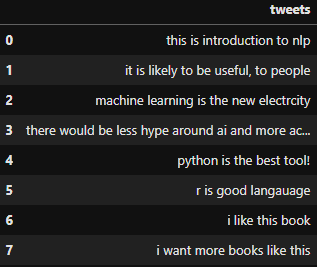# Intro
When it comes to working with text, there also exists unstructured data. If we want to train a model, we have to clean up the training-data to improve the quality & training-duration of the model. When speaking about unstructured data, we have to translate the text for our model to structured data.
# 1. Text-Processing
# Cleaning
Use Regex to clean the data. This step removes things like -tags, characters like ”/}“…
# Normalizing
Use .lower() function to transfer the text in smaller-case. Remove punctuations from the text.
df = pd.DataFrame({"tweets" : tweets})
#df = pd.DataFrame(data=tweets, columns=["tweets"])
df["tweets"] = df["tweets"].str.lower()
#df["tweets"] = df["tweets"].apply(lambda x: x.lower())
df
df["tweets"] = df["tweets"].str.replace("[^\\w\\s+]", "", regex=True)# Tokenize
Seperate the text to “Tokens” (one sentence - seperated word by word)
# Stopwords
Stopwords are words, that often appear in our language. Examples would be “a, the, …” Image searching in your search engine “How to develop chatbot using Python” - Here, the search engine will remove the stopwords “how, to”
# Stemming
# Lemmatization
# POS
”Part Of Speech-Tagging”
POS using NLTK:
import nltk
from nltk.tokenize import word_tokenize
from nltk.corpus import stopwords
from nltk import pos_tag
nltk.download('stopwords')
nltk.download('punkt')
nltk.download('averaged_perceptron_tagger_eng')
# for a list of categories
nltk.download('tagsets_json')
text = "I love NLP and I will learn NLP in 2 month"
stop_words = set(stopwords.words('english'))
words = [token for token in word_tokenize(text) if token not in stop_words]
print(nltk.pos_tag(words))
# [('I', 'PRP'), ('love', 'VBP'), ('NLP', 'NNP'), ('I', 'PRP'), ('learn', 'VBP'), ('NLP', 'RB'), ('2', 'CD'), ('month', 'NN')]In this example you can see, that “I” is a Personal-pronoum. “love” is a Verb. …
List word-categories
# note: the import above is needed!
nltk.help.upenn_tagset()POS using spacy:
import spacy
nlp = spacy.load("en_core_web_sm")
text = "I love NLP and I will learn NLP in 2 month"
doc = nlp(text)
words=[token for token in doc if token.is_stop == False]
for token in words:
print(token.text, token.pos_)
# love VERB
# NLP PROPN
# learn VERB
# NLP PROPN
# 2 NUM
# month NOUNNote: “I” is also identified as stopword. So it gets removed